- Преподавателю
- Иностранные языки
- Урок по английскому языку Sport in my Life
Урок по английскому языку Sport in my Life
| Раздел | Иностранные языки |
| Класс | - |
| Тип | Конспекты |
| Автор | Ильина И.П. |
| Дата | 15.02.2016 |
| Формат | docx |
| Изображения | Есть |
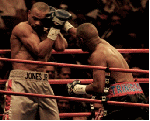
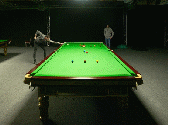
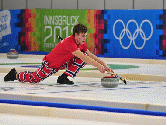
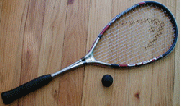
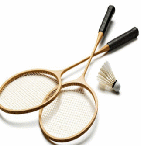
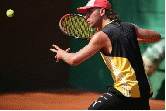
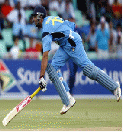
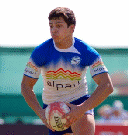

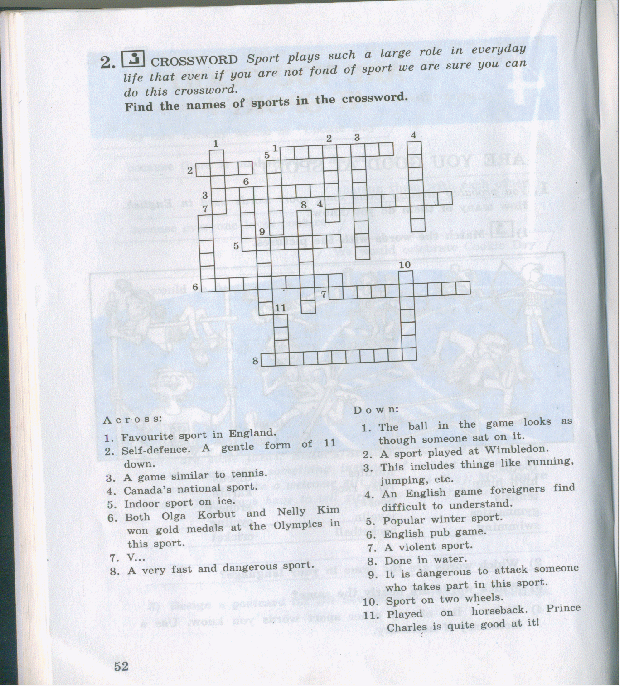 Lesson Plan
Lesson Plan
developed by Irina Ilina, Rybinsker Urban Infrastructure Collage
Topic: Sport in my Life.
Aims:
-
to develop students vocabulary skills around sports;
-
to develop reading skills ( reading for specific information);
-
to develop conversation skills around the topic Sport.
Recourses: Worksheets (Appendixes 1-11)
Introduction
This lesson reviews vocabulary relating to sport. The new vocabulary also takes place. Students read the text about national sports in Great Britain, make tasks for specific information. They answer the questions about national sports in Russia and make conversation about sports they are fond of.
The material should be used during a double-lesson (90 min).
Procedure
-
Greeting, the aims of the lesson
-
Vocabulary
-
A teacher puts the students in mixed-ability groups to do worksheet task 1.
Students should divide the sports below by different groups and fill in four tables (each group has its own table). Then the whole class should give feedback.
-
A teacher puts the students in mixed-ability pairs to do worksheet task 2. Students name the sports associated with the things in the box below.
-
In mixed-ability pairs students do worksheet task 3. They match the sports with the places where people can do these sports.
-
Students should guess what sports people are talking of. Students can read the statements (worksheet task 4) by themselves or listen to the teacher. The task can be done as a small competition between two teams (mixed-ability groups).
-
Students should find the names of sports in the crossword
(worksheet task 5). The task can be done individuals or in mixed-ability pairs.
-
Reading (for specific information).
-
Tasks before reading
-
Before reading (text about national sports in Britain) students need to systematize their knowledge around national sports of different countries. A teacher asks them to do worksheet task 6. Students say what countries the sports in the box associated with.
-
The teacher gets students to name some national sports in Britain or in the USA. Then students need to label the pictures (worksheet task 7) using the sports which are popular in Great Britain.
-
Students should prevent if the information about national sports in Britain true or false (worksheet task 8).
-
Scanning of the text
Students read the text (worksheet task 9) and find out if they are right in their prediction in worksheet task 8.
-
Tasks after reading\Speaking
-
A teacher asks students to find in the crossword (worksheet 10) 10 international words about sport. The task can be done individuals or in mixed-ability pairs.
-
Students answer the questions about national Russian sports.
-
What popular winter sports in Russia do you know?
-
What are the most popular summer sports in Russia?
-
What kinds of racing are popular in our country?
-
What are the most popular sports among young people in Russia?
-
What Russian sportsmen is our country proud of? What kinds of sports are they famous in?
-
Speaking
-
Students should say which sports they prefer or which sports they are not good at and give some reasons. They use phrases from the box from the worksheet task 11 or their own ideas.
-
A teacher puts the students in mixed-ability pairs. Students should ask their group mates
-
if they like to go in for sports;
-
what sports they prefer;
-
what traits of character and skills they need to be good at them;
-
if they go in for unusual sports;
-
if they would like to try them. Why? Why not? (Worksheet 12)
-
Round-up. Homework.
-
Students should write about their sport favour (using worksheet task 11 as a model)
Worksheet task 1
Learn the names of the sports. Fill in the tables
Aerobics
Archery
Athletic
Baseball
Basketball
Boxing
Chess
Cricket
Cycling
Diving
Fencing
Figure skating
Football
Golf
Gymnastics
Handball
Hockey
Horse riding
Ice-skating
Judo
Jumping
Rugby
Running
Sailing
Skiing
Skating
Swimming
Synchronized swimming
Table tennis
Tennis
Volleyball
Walking
Water polo
Waterskiing
Weightlifting
Windsurfing
Wrestling
Group 1
Teams sports
Individual sports
Pair sports
Group 2
Team game
Table game
Races
Athletic competitions
Group 3
Games played with a ball
Games played with bats, clubs, rackets, etc.
Games which include mental activity
Group 4
Winter sports
Summer sports
Both winter and summer sports
Worksheet task 2
What sports the following things and activities are associated with?
bat sledge figure field ice jump goal shooting skiing ski-jumping cycling swimming bicycle ball net skating rink
-
Biathlon
-
Bobsleigh
-
Freestyle
-
Pentathlon
-
Water polo
-
Hockey
-
Golf
-
Cycling
-
Tennis
-
Football
Worksheet task 3
Match the sports and the places:
Sports
Places
swimming
stadium
skating rink
pool / lake
river / sea
mountains
fields
forest
street
sports ground
court
gym
ice hockey
athletics
roller skating
figure skating
cross country running
cycling /skiing
riding
tennis
water skiing
windsurfing
surfing
Worksheet task 4
Say what sports these people are talking of.
-
A round ball is used in this game. Two teams of 11 players kick it. They are not allowed to handle (брать руками) the ball.
-
It's very popular with women. You can do it in a sports centre with music or just classes shown on TV.
-
You can play this game at home or in gym. You need a partner, a table, a small ball, a net and two small bats.
-
It's the cheapest but very healthy form of sports. Nothing is needed. You get up in the morning and travel on foot enjoying the countryside.
-
It's a game for two or four players who hit a ball with rackets across a net.
-
It is a summer game played on a grass field by two teams with a ball, bats and wickets.
-
It is a game by two or four persons with a small hard ball which is struck with clubs into holes.
-
It is a team game played with an oval ball.
-
It is a game played by two persons on a board.
-
It is a kind of shooting with a bow and arrows.
Worksheet task 5
Worksheet task 6
Which countries these sports associated with?
FOOTBALL
RUSSIA
GREAT BRITAIN
GREECE
USA
NORWAY
FINLAND
CANADA
ITALY
GERMANY
BRAZIL
ICE-SKATING
HORSE RIDING
BOXING
FIGURE SKATING
TENNIS
BASEBALL
ICE HOCKEY
CYCLING
SKIING
CHESS
BASKETBALL
Worksheet task 7
Label the pictures. Guess what kind of sport it is. Use the sports:
curling snooker football boxing rugby squash
lawn tennis badminton cricket golf
___________________ ________________ ______________
____________________ ________________ _____________________
____________________ __________________ __________________
Worksheet task 8
Prevent if this information true or false.
True
False
Football, golf, cricket, soccer, rugby, tennis, racing belong to national British sports.
Cricket is an individual sport.
Cricket is played in summer.
Soccer is a kind of football.
Rugby is a kind of tennis which is played with an oval ball.
Golf is played only in Scotland.
The most important tennis tournament is held in Wimbledon.
There are few winners from the UK in international table tennis competitions.
There are different kinds of racing in England.
Worksheet task 9
Read the text and find out if you are right.
The British pioneered many of the sports such as football, cricket, golf.
Cricket is played by two teams of 11 players. They usually wear white clothes. The game is very slow. Matches last from one to five days. Cricket is played in summer. To many Englishmen cricket is both a game and a standard of behavior. When they consider anything unfair, they say «That's not cricket. »
Another game which attracts the greatest attention is soccer (European football). It is the exciting team game for 11 players in each one. Professional soccer is a big business. The Cup Final played in London is the main event of the football season.
Rugby was stated in 1823. That year a pupil of Rugby School William Webb Ellis handled the ball and ran with it during a game of football. The first set of rules was set out in 1845.
Since that time rugby is played all over Britain. It's a kind of English football which is played with an oval ball, and players can both kick or run with it. The standard game (Rugby Union) has been played by teams of 15. There are 13 players and different rules in Rugby League.
Golf began to develop in Scotland and is now widely spread all over Britain.
A great number of people play and watch tennis. Among many tennis tournaments the most famous is the one in Wimbledon.
Table tennis was invented in England in 1880. Although the game was originated in England, British players don't have much chance in international championships.
The British are fond of racing. Horse racing, dog racing, boat racing and motor racing are among the most popular kinds of sport in Britain.
Horse racing is also extremely popular in Great Britain. The racing season includes five races. The Derby is the most popular horse race in Britain.
Worksheet task 10
Great Britain is the birthplace of many kinds of sports, that's why many of them have English names. A lot of English words are also used in Russian sport language.
Find in crossword and write down 10 international words about sport.
C
A
R
D
E
V
G
H
I
T
F
R
E
E
S
T
Y
L
E
I
J
L
C
R
O
S
S
M
N
M
O
P
O
V
E
R
T
I
M
E
Q
R
R
I
N
G
S
T
U
O
V
W
D
X
Y
Z
A
B
C
U
D
E
S
P
O
R
T
F
G
T
G
A
M
E
H
I
J
L
M
N
G
O
A
L
K
E
E
P
E
R
P
E
N
A
L
T
Y
O
P
Q
Worksheet task 11
Which sports do you prefer? Which sports are you not fond of? Give some reasons. Use the phrases from the box or your own ideas.
Example: I prefer cycling to horse riding because I am afraid of horses. A for cycling I do it well.
Use the sports: Football\dance\ badminton\tennis\ hockey\aerobics\ chess\windsurfing\rugby\skiing\ gymnastic\kickboxing
-
-
I can`t swim
-
I`m afraid of…
-
I hate cruel sports
-
I don`t know how to play
-
I enjoy doing sports with music
-
I`m good at…
-
It`s easy to play and I know the rules
-
It develops the muscles
-
It develops not only the muscles but the brains too
-
Worksheet task 12
Ask your partner
-
if they like to go in for sports;
-
what sports they prefer;
-
what traits of character and skills they need to be good at them;
-
if they go in for unusual sports;
-
if they would like to try them. Why? Why not?
Reflection
The main aims of this lesson to develop practical vocabulary and conversation skills around the topic Sport in my Life and in reading to specific information.
The first part of the lesson is aimed at vocabulary practice. Students learn the names of different sports, things and activities associated with them. They classify and match the words, do a crossword. As a rule, this activities and tasks are suitable to do by all pupils in mixed-ability classes. They can be done individuals or jointly with a teacher. To save the time, it's worth to do the tasks in mixed-ability groups or pairs, where students with high language level help the students which are weak at that. For example, the statements in worksheet tasks 4 and 5 can be difficult to understand because of numerous unknown words in the text. The work in mixed-ability pairs can solve this problem. The tasks after reading are also appropriate to do in mixed-ability pairs.
However, the tasks for conversation practice should be done individual (worksheet task 11) and in similar ability pairs (worksheet task 12). The worksheet tasks 11 and 12 contain the standard questions and phrases which help to form the student's statements. Students with high language level should use their own ideas to tell about their sport favour. The worksheet tasks 2-5 can be done as in mixed ability groups\pairs so in similar ability groups\pairs. The strong learners work on their own, the weak learners get tips from a teacher. To put the pairs and groups in mixed ability classes I usually do it by myself and I try to change the partners several times during the lesson.
Analyzing the tasks we can find them rather suitable for mixed abilities and needs.
The wide variety of content and tasks will be interested by all learners. The tasks allow the needs of the students with different types of information's perception. Using of group work forms and team games is necessary for «kinesthetics». Using of visualizing worksheet tasks is right for «visuals». «Audials» learn the information during the task's check stage when students and a teacher pronounce the answers.
The tasks for their own learning also take place (worksheet task 11, Homework task).
Combination of above-mentioned forms, tasks and strategies allows an effective lesson for different abilities.


